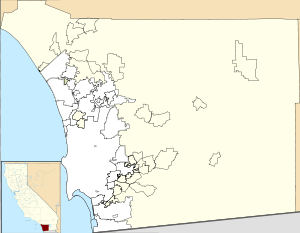Gaslamp Quarter, San Diego
|
Gaslamp Quarter Historic District | |
 | |
   | |
| Location | Bounded by RR tracks, Broadway, 4th, and 6th Aves., San Diego, California |
|---|---|
| Coordinates | 32°42′42″N 117°9′33″W / 32.71167°N 117.15917°WCoordinates: 32°42′42″N 117°9′33″W / 32.71167°N 117.15917°W |
| Area | 38 acres (15 ha) |
| Architect | Multiple |
| Architectural style | Late Victorian, Art Deco |
| NRHP Reference # | 80000841[1] |
| SDHL # | 127 |
| Significant dates | |
| Added to NRHP | May 23, 1980 |
| Designated SDHL | June 2, 1978[2] |
The Gaslamp Quarter is a district of San Diego, California. It is a 16½ block historical neighborhood in Downtown San Diego, and is the site of several entertainment and night life venues, as well as scheduled events and festivals, including Mardi Gras in the Gaslamp, Street Scene Music Festival, Taste of Gaslamp and ShamROCK, a St. Patrick's Day event. Petco Park, home of the San Diego Padres is located one block away in downtown San Diego's East Village.
The area is listed as a historic district on the National Register of Historic Places as Gaslamp Quarter Historic District. Its main period of development began in 1867, when Alonzo Horton bought the land in hopes of creating a new city center closer to the bay, and chose 5th Avenue as its main street. After a period of urban decay, the neighborhood underwent urban renewal in the 1980s and 1990s.
The Gaslamp Quarter extends from Broadway to Harbor Drive, and from 4th to 6th Avenue, covering 16½ blocks. It includes 94 historic buildings, most of which were constructed in the Victorian Era, and are still in use with active tenants including restaurants, shops and nightclubs.
History

When development of the area began in the 1860s, the area currently known as the Gaslamp Quarter was known as New Town, in contrast to Old Town, which was the original Spanish colonial settlement of San Diego. Though Gaslamps were not the main source of lighting in the district, it was chosen as the symbol for the "Gaslamp Quarter" during the redevelopment and preservation efforts that occurred during the 1980s. In actuality, the main source of lighting was arc lighting.[3] Four new gaslamps have been installed at the intersection of Market Street and 5th Avenue.
Timeline
- 1850: William Heath Davis bought 160 acres (0.65 km2) in what would eventually become the Gaslamp Quarter. Despite heavy investment from Davis, little development happened in this period.[4]
- 1867: Real estate developer Alonzo Horton arrived in San Diego and purchased 800 acres (3.2 km2) of land in New Town for $265. Major development began in the Gaslamp Quarter.[5]
- 1880s to 1900s: Known as the Stingaree, the area was home to many saloons, gambling halls, and bordellos.
- 1950s-1970s: The decaying Gaslamp Quarter became known as a "Sailor's Entertainment" district, with a high concentration of pornographic theaters, bookshops and massage parlors.
- 1970: Public interest in preserving buildings downtown started, especially in Gaslamp Quarter.
- 1976: The city adopted the Gaslamp Quarter Urban Design and Development Manual, aimed at preserving buildings in the area, and the redevelopment of Gaslamp Quarter as a national historic district.
- 1982: Gaslamp Quarter became the major focus of the redevelopments in downtown by the city of San Diego.
See also
References
- ↑ National Park Service (2009-03-13). "National Register Information System". National Register of Historic Places. National Park Service.
- ↑ "Historical Landmarks Designated by the San Diego Historical Resources Board" (PDF). City of San Diego.
- ↑ "Gaslamp Quarter Historical Foundation". www.gaslampfoundation.org. Retrieved 2016-04-13.
- ↑ "Gaslamp Quarter Historical Foundation".
- ↑ "San Diego Historical Society".
External links
| Wikimedia Commons has media related to Gaslamp Quarter, San Diego. |
- Gaslamp Quarter Association
- Gaslamp Quarter Historical Foundation
- Centre City Development Corporation
- Information about Gaslamp Quarter Happenings
- Information about Gaslamp Neighborhood